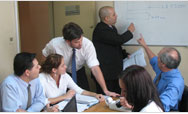USAID/OTI Sri Lanka Hot Topics June 2005
OTI Funds Successful Community-Consultation Series in Matara District
The social fabric of the tsunami-hit areas of Sri Lanka has been disrupted by extensive physical damage, loss of more than 31,000 lives, injuries to more than 15,000, damage to livelihoods, and the displacement of 443,000 people. Community members are unanimous in their cry for a voice in designing local recovery programs. Communities are aware that coordination should not be just between the government and donors, but should involve all stakeholders, including civil society, the business community, local and international nongovernmental organizations, and local citizens themselves. Against this backdrop, the Office of Transition Initiatives has funded a series of community consultations aimed at capturing and giving a public platform to community aspirations in Matara District, one of the areas in the south most affected by the tsunami.
 |
| Participants talk over their community needs in special sessions supported by OTI. |
The OTI-funded community-consultation series is a timely intervention, according to reports received from participants. Chalani Prasangika, a university student, said: "This opportunity for us to identify our needs, agree on them as a community, and present them has been an amazing experience. … We now have faith in ourselves."
The program, which is filled to capacity, uses resource personnel from Ruhuna University to conduct the workshops and 25 undergraduate youth volunteers as facilitators and mobilizers. The university's involvement in a practical exercise that complements its academic orientation has resulted in positive interest among students, who represent the future generations of leadership in Sri Lanka and who also
are those most easily mobilized against peace processes.
Because of this workshop series, Sinhala and Muslim communities that have existed next to each other for decades - but rarely interacted - are now more aware of common needs and are working together to address mutual priorities. "This program has helped us unite, irrespective of religion, ethnicity, caste and political affiliations. This has promoted peace and unity among us," L.H.S. Nihal, a local businessman, said.
For further information, please contact:
In Washington, D.C.: Rachel Wax, Asia and Near East Program Manager, 202-712-1243, rwax@usaid.gov
|


